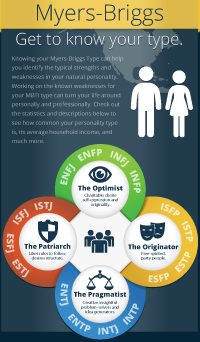ENTJ Personality Type – Extraverted Thinking with Introverted Intuition
The ENTJ personality type (as outlined by the Myers-Briggs Type Indicator® Assessment, or MBTI® Test) is the Extraverted Thinking with Introverted Intuition type. Those that exhibit the ENTJ Type preference are perceptive, discerning, inquisitive, and judicious. They are talented at developing different scenarios for problems and finding how to best and most efficiently solve them. MBTI test-assessed ENTJ Types work well in positions where they must best systemize people, procedures or things. The natural-born leadership skills that the ENTJ Type possess, as well as other innate skills of theirs, greatly aid them in their workplace:
- Find themselves falling into authoritative positions with ease, as their coordinating skills are admired by those around them, who sit back and allow them to take the reins
- Adept at formulating present and future plans to achieve realistic and theoretical goals
- Find the loose screws in certain processes and methods and work toward creating more efficient ways of completing tasks that have preconceived standards that are less productive than desired
- Can see underlying patterns and associations in companies, data, and relationships
- Organize others and themselves to create the best possible process for completing their desired goal
- Foresee potential issues before they arise and work towards avoiding them at all costs
ENTJ Types Are Hard-Thinking, Hard-Working People
Myers-Briggs® test ENTJ Types are notional, widespread, and creative. They are realistic innovators, with the innate ability to arrange and devise a plan for themselves and for their company. This personality type finds themselves invigorated by other people that challenge them and make them stronger thinkers and workers. Others find the ENTJ Type to be motivating, unbiased, and explicit. The ENTJ Type also dislikes mundane tasks, favoring complex issues without present answers.
Those with the MBTI test-assessed ENTJ Type are adept conversationalists, and enjoy engaging in discussions that involve back-and-forth exchanges of opinions and information, feeling that these conversations often make each participant grow. In these types of conversations (as well as in their professional and personal circles), ENTJ Types enjoy surrounding themselves with strong, intelligent personalities (much like themselves) who are open and honest about their opinions without being judgmental or pushy. However, because of this culmination of strong personalities, some people can find an ENTJ Types need for constructive discussions overwhelming, feeling as though they are searching for an argument.
Occasionally, an ENTJ Personality Types desire to engage in conversation can bring out their less-than-desirable qualities. For example, in professional and personal situations, Myers-Briggs Test -assessed ENTJ Type individuals can be bossy without allowing others to voice their opinions or thoughts, or may act grave and unwelcoming to others. Similarly, some individuals with the ENTJ Type can even instigate issues when nothing exists, just for the sake of having an argument.
Sometimes Too Much Focus is a Bad Thing
The mind of the ENTJ Type is often focused on one thing, and because of this, they may come off as uncongenial or unsympathetic. They may develop plans only based on their own desires instead of those of the other people involved, and because they aren’t always aware of the emotions of others, they may not recognize a peer’s desire for intimacy or friendship and may not give as much appraisal as their peer finds necessary.
MBTI Test ENTJ Types don’t often weigh the consequences or possibilities of other options when making decisions, meaning that they can rush into something without giving it enough processing time. Similarly, the ENTJ Type tendency to rush into something can mean that they fail to develop a timeline for their choices or decisions, making them less than concrete. They also can look at information only in broad terms without noticing significant details that could have a much larger impact than the ENTJ realizes. By slowing down and taking into account the consequences of their actions, as well as by picking their arguments carefully, the ENTJ Type will be more approachable and organized, both in the workplace and in their personal lives.
[All personality information was referenced from the following publication- (Isabel Briggs Myers, 1998, CPP Inc.)]Natural Leaders in Many Careers
The Myers-Briggs Type Indicator Personality Test ENTJ Types wide-looking scope and natural leadership skills make them skilled employees in scientific or medical fields, succeeding especially in occupations where they are in charge. They often make great executives in legal, architectural, engineering, scientific, transportation, sales, arts, sports, and media fields. Other occupations that are popular among the ENTJ Type are management consultant, urban regional planner, and internist (Allen L. Hammer, 1993, CPP Inc.).
While long-term planning is not a problem for ENTJ personality types, they may find it difficult to establish specific enough goals because of their wide-range scope. Because of this, when unplanned occurrences happen, ENTJ Types may not know how to best react or deal with them. By planning ahead for any sudden changes in their plans, MBTI-assessed ENTJ Types can be more ready for unforeseen circumstances and actually use those chances to their advantage.
Similarly, if Myers Briggs-assessed ENTJ Types look too much towards the future and lose sight of their present situation, they may not get exactly what they could out of their jobs. They may fail to see the potential of the jobs that they are in or even in jobs that present themselves to them when they least expect it. By enjoying the now and searching for enjoyment in their present situations, individuals that exhibit the ENTJ Type preference can be happier about their positions and may even find unforeseen advantages of their current careers.
Stop and Smell the Humanity Once in a While
Most importantly, the ENTJ Personality Type needs to step outside of their minds every so often to appreciate the less rational aspects of human life, such as feelings and emotions. By creating goals based on their feelings, and by emphasizing the role that feelings play in certain situations, the ENTJ Type will not only open themselves up to more opportunities in the workplace and in different projects, but they’ll also become more amicable to others who had previously seen them as too severe.
Click on one of these corresponding popular ENTJ Careers for detailed information including Career Stats, Income Stats, Daily Tasks and Required Education: Aerospace Engineers, Architect, Architectural and Engineering Manager, Chef, Computer and Information Systems Managers , Electrical Engineer, Emergency Management Director, Epidemiologist, Market Research Analyst, and Pharmacists.
Further Understanding ENTJs
ENTJs are natural leaders and are among the most organized individuals. They are able to develop long-range visions of their organizations and break them down in a sensible manner into shorter-term benchmarks. As highly analytical, logical individuals, ENTJs are decisive and assertive in their actions and clear in their directions. On an intellectual level, they are very curious, and enjoy engaging with the complexities and details of any situation. They are innovative thinkers and global planners, and are often able to efficiently solve problems that would be extremely challenging for most individuals. They are highly strategic, and are an asset to any organization.
While others may see ENTJs as overly critical, even argumentative, ENTJ Personality Types are in fact rarely emotionally invested in their arguments. They learn a great deal by challenging others’ positions, and expect that mutual learning will take place as a direct result of a mutually-critical dialogue. As a result, they seek out other individuals who are knowledgeable, who are able to argue persuasively, and who are able to clearly express themselves. However, their direct, challenging nature may make others interpret their behavior as being overly critical or harsh, even if it is not intended as such.
ENTJs, like all personality types, should also make an effort to balance their personalities characteristics, for instance, by developing reliable strategies for evaluating their strengths and insights, or remaining self-aware if they become too impersonal or directive. They also risk becoming too abrasive or aggressive, and so developing strategies for self-regulation can be of the utmost importance, especially when working with more emotional individuals.
ENTJs’ Learning Style: Directive and Decisive
ENTJs are highly analytical individuals. They absorb information quickly, consider its value and implications, and apply it swiftly and intentionally. They enjoy being in charge, and they thrive in learning environments that promote organization and task completion. They pride themselves on accomplishing complex assignments with high standards and in record time. However, their obsession with punctuality may in fact detract from their ability to focus in some learning environments that do not operate strictly by the clock.

Information, tips and strategy regarding The Myers-Briggs® ENTJ Type including their Learning Styles, Leadership Tendencies, Emotional Intelligence, and Emotional Outlook.
ENTJs are best-suited for learning environments in which they are presented with structured opportunities to engage in critical thinking and task-oriented lessons. They often require the structure of clear objectives and expectations, but appreciate the flexibility to explore and apply information relatively independently. For this reason, Myers-Briggs® ENTJs can be frustrated by lengthy presentations, such as lectures or even questions from more long-winded peers. This emphasis on efficiency also means that ENTJs need to truly understand the benefit of completing tasks in a group rather than individually, because they need to be able to justify the additional demand on time. If the advantages of group work do not outweigh their disadvantages, then ENTJs may become impatient or detached, even leaving group settings to complete the same task independently if they believe it to be more efficient. ENTJs tend to be competitive when interacting with other learners, often focusing on earning the highest marks, winning debates, or earning prizes. They are often critical of their peers, doubting their competence or holding them to unrealistically high standards. This tendency towards perfection also contributes to their dispreference for engaging in group work.
When it comes to instructors, ENTJs value competence above all else. They expect their instructors to be subject experts as well as training experts – to have a mastery of the content material as well as of the delivery itself. They also expect instructors to have references and be able to support their claims using objective or empirical data to do so. This also means that ENTJs have a dispreference for the Socratic method, in which the instructor asks semi-rhetorical questions to which students know she already has the answer. Instead, ENTJs prefer information to be presented concisely, clearly, and accurately, with additional resources as needed to support the original points. They prefer feedback to be given in a similar manner – directly, specifically, and punctually. In other words, they like to know exactly what changes they are expected to make to what projects. Without precise feedback, they argue, they have no way to reliably make changes and continue to improve.
ENTJs’ Leadership Style: Strategic and Decisive
ENTJs are natural strategic planners. They are able to maintain a cohesive long-term vision, and intuitively identify stepping stones or benchmarks to achieve along the way. They are also fierce and proactive in advocating for their needs, easily weighing multiple options and distinguishing among vital needs and preferences. In other words, they are able to rank their needs and be realistic about what is achievable and what is not. This high level of decisiveness as well as their willingness to work in situations that are less than ideal may make others believe that their own opinions are being ignored or that their contributions are being limited to the planning process. As they continue to grow as leaders, ENTJs should make an effort to genuinely explore the contributions of others, considering their possibilities and implications as well as their logical conclusions.
Because of their confidence and competence, ENTJs are generally able to gather support for their ideals. Others generally see them as being independent, fair, and energetic, identifying the best possible path for change and working tirelessly to achieve it. ENTJs are also fairly charismatic, and often use this charisma to motivate others and encourage them to be their best. In general, ENTJs are strong leaders and enjoy being in the spotlight. However, others may see them as being overly ambitious and even power-hungry. Because they have little patience with individuals’ feelings or emotions, they often come across as being detached or even intimidating. They should make an effort to develop personal relationships with others, understanding what drives them and what they see as important. In doing so, they will become stronger leaders, able to offer their team members more individualized support.
As ENTJs move into the actual implementation of any task, they have an acute ability to cut through bureaucracy, which they see as causing unnecessary inefficiencies. They see opportunities to restructure systems almost intuitively, and mobilize processes to do so whenever possible. They also pride themselves on being able to identify unnecessary initiatives and streamline task flows in order to make them proceed as efficiently as possible. ENTJs are engaged and enthused by challenges, and surround themselves with others who have similar motivations. Throughout their work process, they remain focused on the outcome—a job done well, efficiently, and punctually. However, along the way, they may be so focused on the outcome that they neglect delegating tasks to others in a way that facilitates their growth, making others feel under-appreciated or underutilized. If they spend a bit more time considering the needs and values of others, they can utilize their skills and motivations more efficiently and effectively, ultimately improving the quality and quantity of their contributions.
ENTJs and Emotional Outlook: Analytical and Systematic
ENTJs are generally realistic and self-aware individuals. They are fairly accurate in gauging their own competencies and capacities, and are able to identify realistic goals for themselves. However, they do not generally value emotions or moods, and may even dismiss them as being irrelevant. They make a conscious effort to direct their attention as logically and rationally as possible, though they may at times act based on their own intuition. They achieve the highest emotional satisfaction themselves when they are able to solve complex problems, especially if they involve the application of creative or logical solutions. While they do not often lose control of their emotions, they are often angered by incompetence, judging those who they view as being overly indecisive or sluggish. On the other hand, they value speed and accuracy in decision making and action.

Information, tips and strategy regarding The Myers-Briggs® ENTJ Type including their Learning Styles, Leadership Tendencies, Emotional Intelligence, and Emotional Outlook.
ENTJs are motivated by goals and the opportunity to develop expertise. They seek to excel however possible, and see the structure of organizations as the ladders they use to climb to the top of their company. They often have a deep institutional knowledge, which they leverage in order to achieve their goals.
In their association with others, ENTJs tend to be outgoing and well-connected. They are respectful of others and openly communicate that respect, though they may not necessarily be sensitive to others’ emotional needs. On the other hand, they do solicit feedback and are constantly looking for ways to improve themselves and their performance. They are generally supportive of others’ beliefs even if they deviate from their own, provided that they are open to discussing them and are willing to subject them to a reasoned analysis. Even in times of heated discussion or conflict, ENTJs are explicit in their respect for others, and their intent to understand their points of view. They rarely become emotionally invested in a debate, and tend to be focused on the problem or disagreement at hand rather than on the person per se. However, most ENTJs would benefit from making an effort to become more attuned to the pragmatic needs of others, as well as their personal feelings. With a bit of work, they can become even stronger leaders and team members in any organization.
ENTJ Personality Types in The Workplace
Extraverted Intuition with Thinking and Judgment (ENTJ) personality types are natural leaders. Their outgoing personalities and innate charisma inspire others to follow them. They often rise to leadership levels in their organizations and are highly adept at planning for the future needs of their organizations and of the people within them. Their strategic vison helps focus efforts to achieve short term and long-term goals effectively and efficiently, without losing sight of the big picture.
ENTJs are also highly organized, both mentally and physically. Their workspaces are tidy, their lives are scheduled, and they pay astonishing attention to detail. To ENTJs, logical contradictions and operational inefficiencies are not only immediately apparent but also extremely irritating. ENTJs find themselves immediately dedicated to mobilizing people and organizations to resolve situations that they find problematic. They thrive when they can see the practical impact their efforts have on the world and people around them, and their strong work ethic and character makes them valuable contributors to any team.
ENTJs and Communication in The Workplace: Critical and Detail-Oriented
ENTJs are strong, clear communicators. They often challenge others to articulate their beliefs clearly and unambiguously, and they expect others to have the confidence to stand behind their statements. ENTJs may ask clarifying questions to ensure that they fully understand others’ points, though they may become irritated by other team members who continue to discuss an issue even after clarity has been reached. On the other hand, there may be times when others have no further questions and may become annoyed by ENTJs’ seemingly incessant interrogation. On occasions, ENTJs may even come across as being overly critical or confrontational. ENTJs may also annoy others who feel they monopolize conversations without giving others enough time to express their own ideas.
If you are in a meeting with an ENTJ, and find yourself getting frustrated, keep in mind that their intent is to better understand others’ opinions, not to be malevolent or counterproductive. In fact, ENTJs rarely enjoy discussion for its own sake, and instead prefer to use their time efficiently. They prefer to stay focused on the task at hand, and dislike those who spend too much time discussing emotions or being distracted on side pursuits. However, they value identifying the optimal course of action upfront to avoid costly corrections later.
Nonetheless, ENTJs, like all of us, can and should make an effort to improve their communication skills. To do so, ENTJs may need to temper their efficient “no-nonsense” approach to communication and progress, and instead learn that sometimes how you reach your goals and who works alongside you is as important as the final product. A closely related area of improvement is ENTJs’ tendency to dominate discussions—as they continue to grow and develop as communicators, ENTJs should learn to cede the floor and allow others to present alternative opinions and possibilities.
ENTJs and Workplace Contributions: Strategic and Hard-working
ENTJs’ main contribution to their organizations are their strategic vision and attention to detail. They are able to quickly analyze complex situations, identify concrete goals, and develop well-thought-out, step-by-step action plans to reach those goals. This level of planning and action orientation can provide structure and stability to otherwise tenuous organizations. If they sense that their teammates’ resolve or focus crumbling, they will not hesitate to take charge and do whatever it takes to make their goals a reality. ENTJs have a strong work ethic and set a good model for others. They do not shy away from time-consuming or difficult tasks and are instead inspired and motivated by the prospect of overcoming vocational challenges. They take a similar, action-oriented approach when resolving problems also—they confront issues head on and focus on the root cause rather than quick fixes. They also have a particular penchant for solving problems caused by confusion and inefficiency.
ENTJs also tend to drive change in their organizations. They are typically proactive when it comes to implementation but are also realistic in their views of change management. When ENTJs truly believe change is needed, they push to implement it. However, they may lose focus once the urgency of the situation has passed, deciding to move on to new challenges rather than following through on implementation. On the other hand, ENTJs may become frustrated or irritated with other team members who are too flexible or who are unable to commit to a particular course of action to begin with. Organizations may need to find ways to strike a balance between ENTJs’ tendency to leap to action and their inability to follow through.
ENTJs and Workplace Culture: Focused and Independent
ENTJs thrive in workplace environments where they are surrounded by independent, competent people who are dedicated to solving complex problems. They see efficiency as valuable in and of itself and also as a means for effectively achieving their goals. ENTJs rarely see the value of working as an activity, for instance that builds character or because it is something that adults are supposed to do. Instead, ENTJs measure their success in terms of the impact that their efforts have on the world around them, and they work best when surrounded by others who have similar values and measures of achievement. They are decisive individuals who prefer to make decisions quickly and unilaterally; they are often frustrated by organizations that require the input of multiple people or internal stakeholders, as they see this level of involvement as an indication of inefficiency. On the other hand, ENTJs offer structure and focus to develop and implement a master plan.
ENTJs are also drawn to work environments where their natural energy and enthusiasm can motivate others. They approach every task as though it should have been completed yesterday. They throw themselves into things completely, and move at an aggressive pace, which some team members may even find to be reckless. In doing so, they may overlook others’ need for interpersonal contact, emotional support, appreciation or even validation. ENTJs’ focus on the task at hand drives them to be critical and pursue the best possible product, even at the expense of hurting others’ feelings. As ENTJs work to fit into professional environments and collaborate with their co-workers, they may need to take a step back to understand the value of building interpersonal relationships—not only can such relationships provide support and valuable insights into a particular problem, but they can also have benefits in their own right. For instance, ENTJs tend to get overwhelmed by self-doubt when they are under great stress. Having close relationships with co-workers can often alleviate that distress.
ENTJs and Leadership in The Workplace: Visionary and Goal-Oriented
As in every other aspect of their personal and professional lives, ENTJs have an action-oriented and goal-driven leadership style. They identify their target and pursue it with energy and dedication. They provide their organizations with long-range plans and work tirelessly to achieve them. Most of the time, ENTJs’ energy is contagious and motivates those around them. However, at times they may manage their team members more directly, including by providing specific corrective feedback. Some of their direct reports may find ENTJs’ leadership style to be overly direct and even blunt; they tend to say what they mean without “sugar-coating” criticism. However, ENTJs themselves may become frustrated or impatient with peers who they believe are too kindhearted or “soft”—that is, those who have difficulty making tough decisions. In short, ENTJs lead best when their team thinks in similar ways to how they do themselves—when others enjoy complex problems and manage them resourcefully.
ENTJs’ biggest weakness as leaders is their need for control. ENTJs’ controlling nature stems from their confidence and self-assuredness, as well as their decisiveness. However, others may interpret their behavior as being overpowering, even interfering and nosy. As ENTJs continue to grow and develop as leaders, they need to understand that part of leadership is cultivating others’ skills and talents. While there may be growing pains and their protegees may make mistakes, in the long run, they will have fostered a new teammate who can contribute to projects in more robust ways than ever.
ENTJs can also improve their attention to interpersonal skills. While ENTJs find it easy to reward decisiveness, achievement, and ambition, they may find it more difficult to notice and appreciate the impact of keeping their teammates happy. ENTJs are themselves often motivated internally, and often forget the impact that a kind word or encouraging gesture can have on others’ willingness to make sacrifices to get the job done.
If you are mentoring an ENTJ leader, offer to help them develop patience with their teammates and direct reports. ENTJs think quickly and efficiently and may become frustrated with others who need more time to catch up. However, being impatient is often counterproductive, as if sensitive teammates detect impatience, they may become self-conscious and progress even more slowly. A related suggestion is to observe and provide feedback if you notice the ENTJ becoming arrogant or overly confident about his or her achievements – humility has a role in earning others’ respect, often even more than arrogance.
ENTJs and Problem Solving in The Workplace: Action-Oriented and Strategic
ENTJs are effective and efficient organizational problem solvers. They are unusually perceptive of political and hierarchical structures and are also action-oriented and strategic. They are able to think ahead and anticipate problems easily and almost intuitively. ENTJs approach problems at work using straightforward logic. They thoroughly analyze the situation, considering every possible angle and implication, before committing to a course of action. However, once they commit to a plan, they advocate for it fiercely and even ruthlessly; their goal is to spring to action as quickly as possible without losing valuable time in debate and discussion. They may become irritated when they are expected to work with others who see them as being overly impulsive or who they think lose track of salient details. To an ENTJ, a solution is useless unless it is realistic, addresses all of the issues originally pose, and does not create new problems. ENTJs may also get frustrated when others do not consider problems in a logical or linear way or when others jump to conclusions without considering the implications of their plans.
When they collaborate with others to solve problems, ENTJs often focus on finding flaws in any potential solutions. They not only enjoy playing devil’s advocate but see doing so as an essential step towards reaching their goals. Playing devil’s advocate also gives them the opportunity to test their theoretical plans in a controlled environment and to get others’ feedback on their ideas. However, ENTJs tire when others continue to debate once a solution has been reached. They do not hesitate to move on to the implementation phase once they decide on a course of action, even when there may be value to further reflection and discussion.
ENTJs and Areas of Growth in The Workplace: Interpersonal and Emotional
While ENTJs are strong, focused personalities, all of us have room for improvement. As ENTJs continue to grow and develop as leaders and as individuals, they should focus on a few concrete areas.
First and foremost, ENTJs should make an effort to consider the human element in the workplace. Appreciating others’ contributions, emotions, and opinions can go a long way towards building a professional community and ultimately working more effectively.
Second, ENTJs may need to be more conscious of resource planning. The solutions they develop may be elegant, but at times may be difficult to implement given constraints of time, human resources, and money. Sometimes, taking the time to step back and consider the situation as a whole can shed light on issues that were previously invisible.
Third and finally, ENTJs have a tendency to state solutions and advocate ruthlessly for their position. If you find yourself doing this, try ceding the floor to someone else and instead thinking of yourself as more of a facilitator. Practice soliciting others’ opinions without correcting them or providing your own feedback. With a few minor changes and self-improvements, ENTJs can become even more valuable contributors to their workplaces.
Learn More About the MBTI ENTJ Personality Type
Explore additional information that delves deeper into the ENTJ Personality Type by examining various personality and career based subjects:
- How the MBTI ENTJ Type relates to Innovation
- How the MBTI ENTJ Type relates to Project Management
- How the MBTI ENTJ Type relates to Emotional Intelligence
- How the MBTI ENTJ Type relates to Leadership
- How the MBTI ENTJ relates to Communication
- The ENTJ Celebrity Personality Types
Click on a link below to read more about different MBTI Personality Types
| ISTJ | ISFJ | INFJ | INTJ | ESTP | ESFP | ENFP | ENTP |
| ISTP | ISFP | INFP | INTP | ESTJ | ESFJ | ENFJ | ENTJ |
References
Introduction to Type (Isabel Briggs Myers, 1998, CPP Inc.)
Introduction to Type and Careers (Allen L. Hammer, 2007, CPP Inc.)
Introduction to Type and Leadership (Richmond, S. CPP. 2008)
Introduction to Type and Learning (Dunning, D. CPP. 2008)
Introduction To Type® and Emotional Intelligence. (Pearman, R. CPP, 2002)
Introduction To Type in Organizations (Hirsh, S. & Kummerow, J. CPP Inc., 1998)



